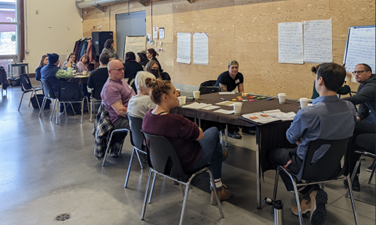Lack Of Affordable Housing For Black Communities In Metro Vancouver
Black communities consistently endure a disproportionate burden in securing safe, affordable, accessible, and sustainable housing in Canada and are therefore at higher risk of experiencing homelessness. This blog post highlights systemic and interpersonal barriers to affordable housing and offers innovative solutions to securing housing of this nature for Black communities in Metro Vancouver and across Canada.

 It is common to hear organizations or governments talk about gathering feedback from the community. In addressing issues such as homelessness, we expect to see consultation from a wide variety of stakeholders including people with lived or living experience (PWLLE). Gaining input in a way that is respectful, appropriate, and beneficial to everyone involved is complex.
It is common to hear organizations or governments talk about gathering feedback from the community. In addressing issues such as homelessness, we expect to see consultation from a wide variety of stakeholders including people with lived or living experience (PWLLE). Gaining input in a way that is respectful, appropriate, and beneficial to everyone involved is complex.